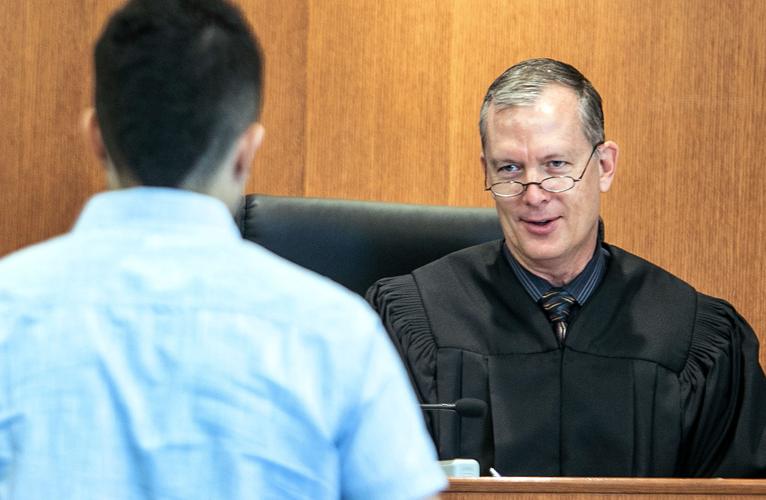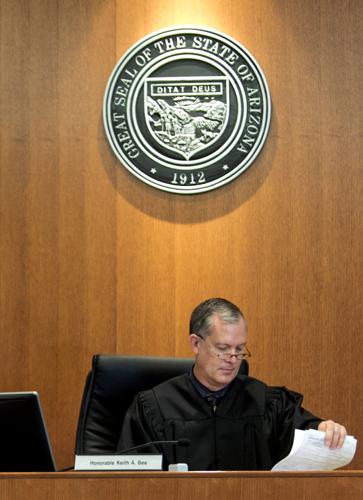A Pima County Justice Court program and judge were honored by the Arizona Supreme Court for their efforts to promote access to justice.
Warrant Resolution Night Court was launched last October 2016, with the monthly sessions offering evening hours for people who have work or personal obligations during normal court hours.
During the Arizona Supreme Court’s 2017 Strategic Agenda Awards last month, the program and Judge Keith Bee, who presides over the monthly sessions, received the award for one of the agenda’s five goals, promoting access to justice, according to Arizona Supreme Court spokeswoman Heather Murphy.
The resolution court offers a variety of services for attendees, including quashing warrants, setting up or re-establishing payment plans, making a payment, filing for extensions, driver’s license reinstatement, submitting documents to the court and scheduling court dates.
From October 2016 to September 2017, night and weekend warrant resolution events at Justice Court have helped 2,533 people at customer service windows, held 1,447 hearings, lifted 714 driver’s license defaults and quashed 667 warrants, according to the Arizona Supreme Court.
Bee first brought up the idea of having extended court events years ago, said Deputy Court Administrator Micci Tilton.
“I was told initially by the court administration years ago that we couldn’t do it because you wouldn’t be able to get the county attorney on board and you wouldn’t be able to get the defense attorneys on board, but we’ve had wonderful participation from all our colleagues on this,” Bee said.
The Oct. 10 court night saw more than 400 people turn out to address warrants, traffic defaults, attend hearings and have smaller legal matters settled.
Upon opening the heavy doors at the Justice Court building, attendees went through a security check, walking through monitors and getting their bags checked before boarding the elevators to get to their designated floor to take care of business.
The second floor saw the most traffic, as it bustled with people meeting with court staff to settle simpler legal matters.
Those looking to settle civil traffic matters headed to the fourth floor, while those with outstanding warrants went to the fifth.
Bee sat atop the bench at criminal court, settling warrants swiftly and with authority, as Ray Carroll, the newly appointed Green Valley justice of the peace and a former Pima County supervisor, sat next to him, observing the event.
A dozen or so attendees were spread throughout the court pews at any given time, waiting to be called up after checking in with the courtroom clerk. Attendees ranged from senior citizens to college-aged adults, many of them in the company of husbands, wives, mothers and friends.
“These are people that would have called and said, ‘Hey what do I do? I haven’t been to court, I need to come in,” ’ Bee said. “Oftentimes people with outstanding warrants are afraid to come to court to settle their warrants, thinking they’ll get arrested if they come to court.”
On the contrary, Justice Court publicizes these events as an opportunity to “make it right,” he said, adding, “We’re not going to punish you by the fact that you’re coming to court to settle things.”
Participants approached the bench when called. Details of their cases could not be heard from the courtroom seating, except for the occasional small talk and lighthearted banter on Bee’s part.
“You might win the lottery and be able to pay all that off at once,” Bee joked to one middle-aged man getting his warrant taken care of. The man laughed and nodded, before thanking Bee and heading to the court clerk to gather his files.
Between settling warrants and as the event neared its end, Bee and Carroll sipped coffee from small cups, keeping their energy up for any latecomers.
“So basically we can schedule people all the way up to 7 p.m. and we stay until everybody’s case has been handled,” Bee said. “The latest we’ve ever stayed has been around 9 p.m. I don’t want to turn it into midnight court.”
Justice Court quashed 49 warrants that night, with Bee attributing the efficiency to volunteer judges willing to extend their day and attorneys who attended the event.
“Very few misdemeanors seek jail time or have jail time as a consequence, and every time someone fails to appear at a court event, that’s another warrant being issued,” he said “So if we can finish these cases, have people come down and settle these cases, the number will go down.”
The warrant caseload at Justice Court, which was 23,000 only two years ago, is now under 17,000, Tilton said, adding that the night and weekend warrant events have helped contribute to the sizable decline.
The next Warrant Resolution Night Court will be Nov. 28 from 4 to 7 p.m.





